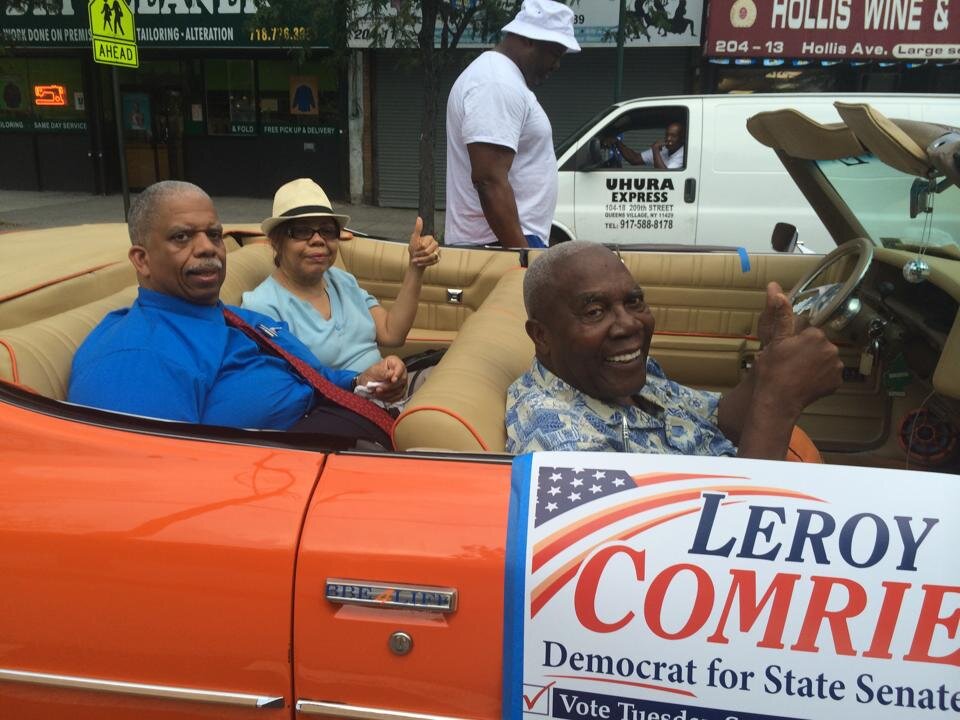Archie Spigner, Southeast Queens councilman and powerbroker, has died at 92
/Archie Spigner (right) with his wife Leslie. Photo via Twitter
By David Brand
Archie Spigner, a political powerbroker who represented Southeast Queens in the City Council for 27 years, died late Thursday. He was 92.
Spigner was the first Black man from Queens elected to the City Council, where he served from 1974 until term limits capped his tenure in 2001. His District 27 included Hollis, Jamaica, Springfield Gardens and other Southeast Queens neighborhoods.
During his tenure, he advocated for major economic development and infrastructure projects in the region, including the Archer Avenue subway extension, York College campus, the Kennedy Airport AirTrain and the High School for Law Enforcement and Public Safety.
“I can’t think of too many projects that you don’t somewhat attribute to Archie,” said Rep. Gregory Meeks. “York College, making sure transportation issues for Southeastern Queens were getting better, healthcare. He was the deputy speaker of the City Council but he was so much like a second Speaker.”
Meeks said Spigner guided generations of leaders and aspiring elected officials with fundamental advice. “Make sure you always help people, be honest with people and stay on the ground,” Meeks said Spigner told him ahead of his first run for office.
In 2001, Newsday called Spigner “the dean of Black politicians” in New York City. “I was the spokesman for the African American community and for minority groups,” he told Queens Press in 2014.
Spigner served as chair of the Housing and Buildings, Economic Development, and Budget Review Committees. He became deputy majority leader and maintained a close relationship with Speaker Peter Vallone, another Queens councilmember.
After leaving office, Spigner remained active in New York City politics as a district leader in the Queens County Democratic Party, as head of the influential Guy R. Brewer United Democratic Club and as the owner of the Spigner Consulting Group.
Archie spigner (right) campaigning for state sen. leroy comrie (left) in 2014. photo via guy r brewer united democratic club/facebook
He continued advocating for his community until the days before his death, said Councilmember Donovan Richards, the Democratic nominee for Queens borough president.
“I was still getting text messages from him about quality of life things — ‘There are trees overgrown outside a hydrant and people are getting ticketed,’” Richards said.
“He hasn’t been a councilman for a while but he was still in tune with city services. He saw something in the street and he let me know,” Richards added.
Richards said Spigner had a profound impact on Queens, particularly for Black and African American residents.
“Archie Signer paved the way for Black elected officials, for so many to really maximize opportunities for our communities,” he said.
Spigner was born on Aug. 27, 1928 in Orangeburg, South Carolina before his family moved to New York City, eventually settling in Southeast Queens during the Great Depression.
He graduated from Central Needle Trades High School in 1947 and began working at a shoe factory. While working at the factory he enrolled in the Jefferson School of Social Science, where he learned about labor organizing.
He became a city bus driver in the 1950s, joined the Negro American Labor Council and later founded the organization’s Queens branch. In that role, he met and began working with Kenneth Browne, a state assemblymember and later Queens’ first Black judge; and Guy R. Brewer, a legendary lawmaker and activist, and the namesake for the club Spigner led for years.
The club, one of the most active Democratic clubs in New York City, announced Spigner’s death on Facebook Friday.
“It's with great sorrow that we announce the passing of our great leader former City Councilman and District Leader ‘The Dean’ Archie Spigner. We will keep everyone updated on memorial services,” the Guy R. Brewer United Democratic Club wrote.
archie spigner (right) with sen. chuck schumer in 2014. photo via guy r brewer united democratic club/facebook
Under Spigner, the club remained a must-visit site for aspiring politicians and would-be lawmakers.
“No one did anything in politics without meeting with Archie Spigner,” Meeks said. “If you wanted to run for governor, for mayor, for president of the United States, you talked to Archie.”
“When you think about Harlem politics for African Americans, you think of Charlie Rangel and Percy Sutton,” Meeks said. “Archie Spigner was to Southeast Queens what Charlie Rangel is to Harlem.”
Sutton, the late civil rights leader and a former Manhattan Borough President, described Spigner’s influence in a speech at a 2001 dinner marking the end of his Council tenure.
“His is the strongest political club in the city of New York,” Sutton said. “I go out each Election Day to be with his people, because I know they are the best and because of my great admiration for him.






